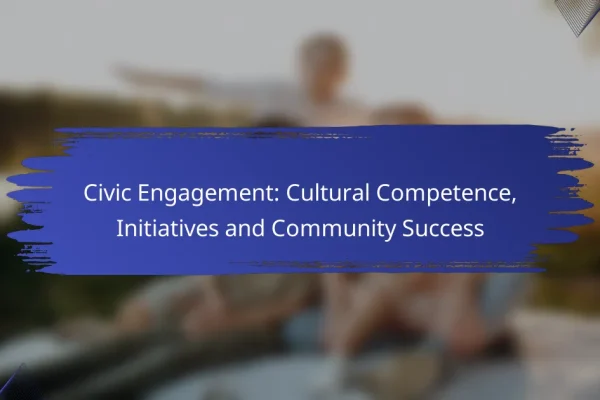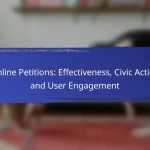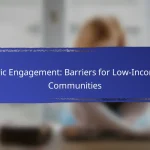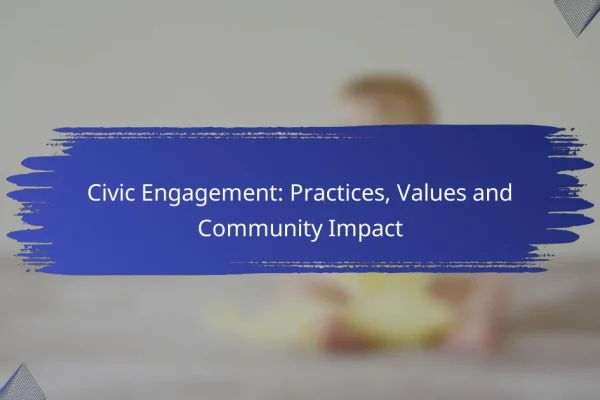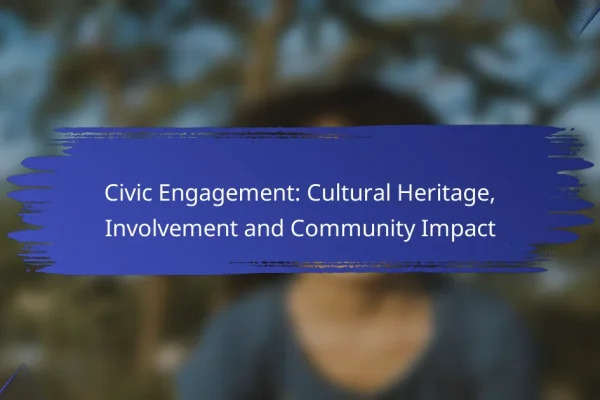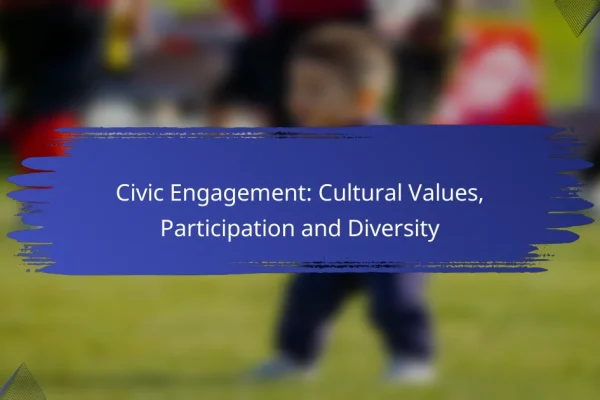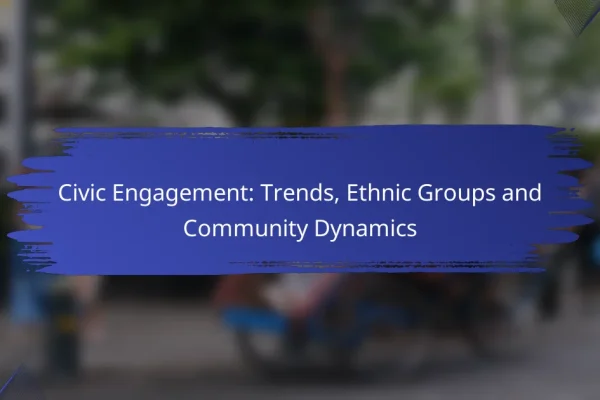How does civic engagement vary across cultures?
Civic engagement manifests differently across cultures, influenced by social norms, values, and historical contexts. Variations can be seen in how individuals participate in community activities, interact with government, and the role of collective versus individual actions.
Individualism vs. collectivism
In individualistic cultures, such as the United States and many Western European nations, civic engagement often emphasizes personal responsibility and individual rights. Citizens may prioritize personal initiatives and self-expression in their participation.
Conversely, collectivist cultures, like those in many Asian and African countries, focus on group harmony and community welfare. Civic engagement here tends to involve collective actions, where individuals participate as part of a larger group to achieve common goals.
Community-driven initiatives
Community-driven initiatives vary significantly across cultures, reflecting local values and priorities. In some regions, grassroots movements are common, with citizens organizing to address local issues such as environmental concerns or social justice.
In contrast, other cultures may rely more on formal organizations or government-led initiatives. For example, in Scandinavian countries, strong social welfare systems often facilitate community engagement through structured programs and funding.
Government participation levels
Levels of government participation in civic engagement can differ widely. In democratic societies, citizens are encouraged to vote, attend town hall meetings, and engage in public discourse. This active participation is seen as a civic duty.
In more authoritarian regimes, civic engagement may be limited, with citizens facing restrictions on their ability to participate in government processes. In such contexts, engagement may take the form of underground movements or non-violent protests.
Influence of religion
Religion can play a significant role in shaping civic engagement. In many cultures, religious institutions serve as platforms for community organization and mobilization, influencing how individuals participate in civic activities.
For example, in predominantly Muslim countries, civic engagement may be intertwined with religious practices, where community service is often viewed as a religious obligation. In contrast, secular societies may see less direct influence from religious institutions on civic participation.
Historical context
The historical context of a culture greatly impacts its civic engagement. Countries with a history of democratic governance often have more robust civic participation, as citizens are accustomed to engaging in political processes.
On the other hand, nations with histories of colonialism or conflict may experience challenges in civic engagement. Historical trauma can lead to distrust in institutions, resulting in lower levels of participation and engagement among citizens.
What are effective civic engagement strategies?
Effective civic engagement strategies involve methods that encourage participation and collaboration among community members to influence decision-making. These strategies can include grassroots movements, digital platforms, and collaborative governance, each offering unique approaches to mobilizing citizens.
Grassroots movements
Grassroots movements are community-driven initiatives that empower individuals to advocate for change at local, national, or global levels. They often begin with a small group of passionate individuals who rally support through outreach, education, and mobilization efforts.
Key steps in building a successful grassroots movement include identifying a clear issue, organizing community meetings, and leveraging local networks. Examples include environmental campaigns, social justice initiatives, and public health awareness efforts that resonate with community values.
Digital platforms for engagement
Digital platforms for engagement utilize online tools to facilitate communication and participation among citizens. These platforms can include social media, dedicated websites, and mobile applications that allow users to share information, organize events, and voice their opinions.
To effectively use digital platforms, organizations should focus on creating user-friendly interfaces and engaging content. Examples include online petitions, virtual town halls, and interactive surveys that encourage civic participation and feedback.
Collaborative governance
Collaborative governance involves partnerships between government entities and community stakeholders to make decisions that reflect the needs of the public. This approach fosters transparency and inclusivity, allowing for diverse perspectives to shape policies and programs.
Successful collaborative governance requires establishing clear communication channels, setting shared goals, and ensuring accountability. Examples include community advisory boards and participatory budgeting initiatives that empower citizens to influence local spending decisions.
How can organizations promote civic engagement?
Organizations can promote civic engagement by implementing strategies that educate, connect, and incentivize community participation. These approaches foster a sense of responsibility and encourage individuals to take an active role in their communities.
Educational programs
Educational programs are essential for raising awareness about civic duties and the importance of participation in democratic processes. These programs can include workshops, seminars, and online courses that cover topics such as voting rights, local governance, and community service.
Effective educational initiatives often target specific demographics, such as youth or marginalized groups, to ensure inclusivity. For instance, schools can integrate civic education into their curricula to instill a sense of civic duty from an early age.
Partnerships with local communities
Building partnerships with local communities enhances the effectiveness of civic engagement efforts. Organizations can collaborate with community leaders, non-profits, and local businesses to create tailored initiatives that resonate with residents’ needs and interests.
These partnerships can facilitate community events, such as town hall meetings or volunteer days, which encourage participation and foster a sense of belonging. By leveraging local knowledge and resources, organizations can ensure their initiatives are relevant and impactful.
Incentives for participation
Offering incentives for civic participation can motivate individuals to engage more actively in their communities. These incentives can take various forms, such as recognition programs, small financial rewards, or access to exclusive events.
For example, local governments might provide tax breaks for residents who volunteer a certain number of hours or offer discounts at local businesses for those who participate in community service. Such incentives can significantly boost participation rates and create a culture of civic involvement.
What role does technology play in civic engagement?
Technology significantly enhances civic engagement by providing platforms for communication, participation, and organization. It allows individuals to connect with their communities and influence decision-making processes more effectively.
Social media campaigns
Social media campaigns are powerful tools for civic engagement, enabling organizations and individuals to mobilize support and raise awareness on various issues. Platforms like Facebook, Twitter, and Instagram allow for rapid information dissemination and community building.
Effective social media campaigns often include clear messaging, engaging visuals, and calls to action. For example, hashtags can unify discussions around specific topics, making it easier for users to find and participate in conversations.
Online voting systems
Online voting systems facilitate greater participation in democratic processes by allowing citizens to cast their votes remotely. These systems can increase voter turnout, especially among younger demographics who are more comfortable with digital platforms.
When implementing online voting, it’s crucial to ensure security and privacy. Many jurisdictions require robust authentication methods to protect voter identities and prevent fraud. Familiarity with local regulations regarding online voting is essential for both organizers and participants.
Mobile applications for civic participation
Mobile applications designed for civic participation provide users with tools to engage with their local governments and communities. These apps can offer features such as reporting issues, accessing public services, and participating in local discussions.
When using civic engagement apps, users should look for those that are user-friendly and well-reviewed. Features like push notifications for local events and updates can enhance user engagement and ensure that citizens remain informed about important civic matters.
What are the challenges of civic engagement in diverse cultures?
Civic engagement in diverse cultures faces several challenges, including cultural barriers, language differences, and access to resources. These factors can hinder participation and limit the effectiveness of civic initiatives.
Cultural barriers
Cultural barriers can significantly impact civic engagement by creating misunderstandings or resistance to participation. Different cultural norms and values may lead to varying perceptions of civic duties and responsibilities.
For instance, in some cultures, collective decision-making is prioritized, while others may emphasize individualism. Recognizing these differences is crucial for fostering inclusive civic participation.
Language differences
Language differences can create significant obstacles to civic engagement, as they may prevent individuals from fully understanding civic processes or communicating their needs. In multilingual societies, important information may not be accessible to all community members.
To address this, organizations should provide materials in multiple languages and consider employing bilingual staff to facilitate communication. This approach helps ensure that all voices are heard and understood.
Access to resources
Access to resources is a critical factor influencing civic engagement, as individuals may lack the necessary tools or information to participate effectively. This includes access to education, technology, and financial resources.
For example, communities with limited internet access may struggle to engage in online civic activities. Providing resources such as workshops, training sessions, and financial support can help bridge these gaps and encourage broader participation.
How can civic engagement impact local governance?
Civic engagement significantly influences local governance by fostering community participation and enhancing accountability. When citizens actively engage in decision-making processes, it leads to more responsive and effective governance.
Benefits of Civic Engagement
Civic engagement brings numerous benefits to local governance, including improved public trust and increased transparency. Engaged citizens are more likely to hold officials accountable, ensuring that their needs and concerns are addressed.
Moreover, when communities participate in governance, they can contribute valuable insights that lead to better policy decisions. This collaborative approach can enhance social cohesion and empower residents to take ownership of local issues.
Challenges to Civic Engagement
Despite its advantages, civic engagement faces several challenges. Barriers such as lack of awareness, limited access to information, and socio-economic disparities can hinder participation. These obstacles often result in underrepresentation of certain groups, which can skew decision-making.
Additionally, some citizens may feel disillusioned by the political process, leading to apathy. Overcoming these challenges requires targeted outreach and education to encourage broader participation across diverse demographics.
Strategies to Enhance Civic Engagement
To enhance civic engagement, local governments can implement various strategies. Hosting community forums and workshops can provide platforms for discussion and feedback, allowing residents to voice their opinions effectively.
Utilizing digital tools, such as social media and online surveys, can also facilitate engagement by reaching a wider audience. Offering incentives for participation, such as recognition programs or small grants for community projects, can motivate citizens to get involved.
Encourage local organizations to promote civic activities.
Provide training for citizens on how to engage with local governance.
Ensure that information is accessible and available in multiple languages.
